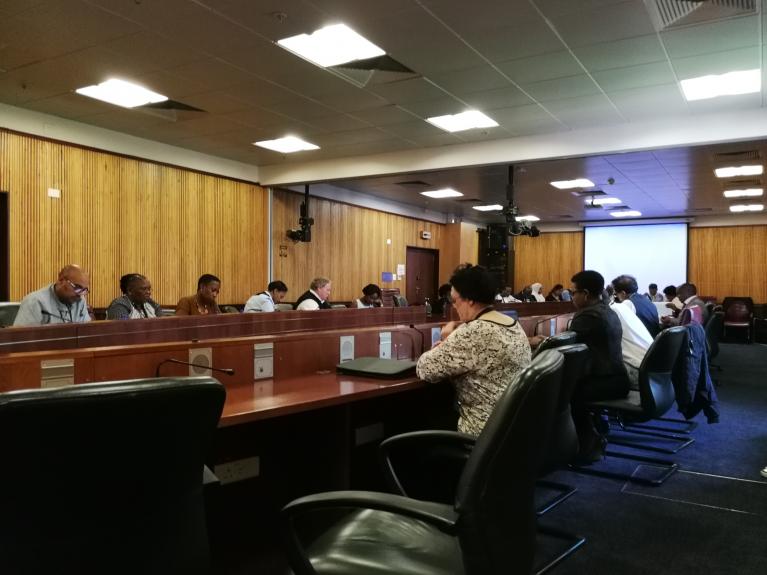Latest Resources

9 November 2018
Release of risky GM mosquitoes in Burkina Faso highly unethical
Press Release issued by African Centre for Biodiversity, Third World Network and GeneWatch UK Johannesburg, 9 November 2018 Release of risky GM mosquitoes in Burkina Faso highly unethical Risky genetically modified (GM) “male-sterile” mosquitoes are due to be released in the very near future, in Burkina Faso by the Target Malaria research consortium. However, Target […]

5 November 2018
AU’s premature and misguided endorsement of controversial, unproven gene drive mosquitos for mala...
Press Release from the African Centre for Biodiversity AU’s premature and misguided endorsement of controversial, unproven gene drive mosquitos for malaria ‘eradication’ in Africa Johannesburg, Monday, 5 November 2018 The African Union (AU) is paving the way for the entry of the latest and most controversial form of genetic engineering, gene drive technologies. In July […]

12 October 2018
WFD Celebrations honouring Seed Diversity and Custodians in the Eastern Cape
Press Release: World Food Day Celebration in the Eastern cape: Phansi GMO Maize Phambili Agrocology! 15th October 2018 On World Food Day, 16th October 2018, the African Centre for Biodiversity is partnering with Zingisa, Ntinga Ntaba ka Ndoda, Ilizwi Lamafama, Mxumbu Youth Cooperative, Calabash Trust and Khanyisa to celebrate and honour local seed diversity, and […]

28 August 2018
Media release: Civil society responds to BioAfrica Convention
For immediate release 28 August 2018 BioAfrica Convention: Open for the business of profit; closed to the questions that matter This week the biotechnology industry meets at the Durban International Convention Centre. Themed “Africa – Open for business” the Convention will explore various ways in which African biodiversity can be exploited for agriculture, industry and […]

26 June 2018
WEMA’S Bt Maize & Fall Armyworm Africa claims are unscientific and unsubstantiated
Press Release from the African Centre for Biodiversity Johannesburg, June 27 A new research paper BT Maize and the Fall Armyworm in Africa: Debunking industry claims published by the African Centre for Biodiversity (ACB) today, debunks unsubstantiated and unscientific claims made by the biotech machinery, especially the Water Efficient Maize for Africa (WEMA) Project, that […]

31 May 2018
Parliamentary consultation & decision making on SA’s Corporate Seed Bills a Sham!!
The African Centre for Biodiversity (ACB) is deeply concerned that South Africa’s draconian corporate seed Bills were approved by the Parliamentary Select Committee on the 22nd May 2018, with no substantial changes being made. This despite a number of provinces having rejected the Bills entirely on the basis that they did not adequately serve the […]

5 April 2018
A tale of neo-apartheid plans, dodgy dealings and corporate capture: Government support to South ...
Press Release from the African Centre for Biodiversity Johannesburg, Thursday 5 April 2018 Limited transparency, weak accountability, and capture by corporations and politically-connected individuals. These are features of the current South African landscape found in government’s smallholder farmer support programmes, according to a research report by African Centre for Biodiversity (ACB) released today. The report, […]

18 October 2017
Farm Input Subsidies and Civil Society’s Position in Mozambique
This statement represents the position of civil society in Mozambique on farm input subsidies.

16 October 2017
Civil society in Mozambique statement on farm input subsidies in that country
This statement represents the position of civil society in Mozambique on farm input subsidies in that country.

23 August 2017
OPEN LETTER TO AFRICAN BIOSAFETY REGULATORS
OPEN LETTER TO AFRICAN BIOSAFETY REGULATORS Do not allow Africans to be used as guinea pigs for untested high-risk new GM technology The Alliance for Food Sovereignty in Africa calls for an immediate ban on the importation into South Africa of Monsanto’s high-risk second-generation gene-silencing genetically modified (GM) maize destined for human consumption. AFSA rejects […]
